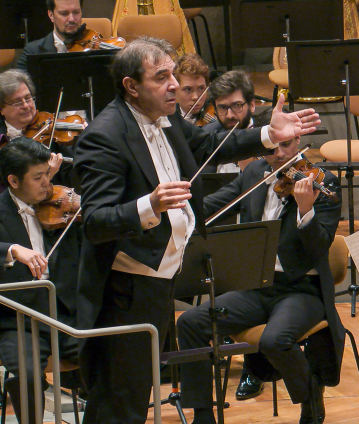Daniele Gatti conducts Stravinsky and Shostakovich

Igor Stravinsky combines in his ballet Apollon musagète the cheerful light atmosphere of the classical era with the easy-going, urban lifestyle of the 1920s. Dmitri Shostakovich, on the other hand, composed his Fifth Symphony in 19th-century aesthetics of sound, ostensibly as a homage to socialism. But his music has a certain ambiguity: “The rejoicing is forced under threat,” the composer wrote. “One would have to be a complete fool not to hear that.”
In Nice in the summer of 1927, Igor Stravinsky had the idea of writing a ballet “without intrigue”, “whose choreographic plot develops from the theme”. However, the result, Apollon musagète, is a plot without a plot: Apollo, the leader of the muses, is born in the prologue and is then surrounded by the muses, who perform their arts one after the other. Art itself becomes the defining theme – with this composition for strings, Stravinsky acknowledges an ancient ideal of beauty, of Apollonian clarity. “I was attracted,” said the composer, “to write music in which the melodic principle takes centre stage. What a joy to once again devote myself to the polyphonic melodious sound of the strings and to work the polyphonic fabric from it, because nothing does better justice to the spirit of classical dance than allowing the flood of melody to flow out in the sustained song of the strings.”
The carefree cheerfulness of the ballet is contrasted with Dmitri Shostakovich’s Fifth Symphony, a work composed a little later, whose reception would literally make the difference between life and death. The public expected an official statement from Shostakovich, a “creative response” to the accusations levelled against him by Pravda, which had branded his Lady Macbeth of Mtsensk as “chaos instead of music”. Shostakovich composed his Fifth in just three months in 1937 – at first glance, a work in the spirit of “socialist realism”: monumental, popular and optimistic. But really only at first – because on closer inspection, even the first thematic ideas are extremely brittle, by no means “simple and understandable melodies”. The monumental turns out to be a manifestation of the brutal, such as when a delicate theme in the first violins is distorted into a grotesque, noisy march. Shostakovich’s music takes the socialist demands for monumentality and popularity to the absurd. Without any coding, the largo presents a pain-filled lament, so poignant that the triumphal jubilation of the finale loses credibility even before it begins. Shostakovich said of it in a private conversation: “There was nothing to cheer about. In my opinion, it should be clear to everyone what is going on in the Fifth. The cheering is forced under duress, as in ‘Boris Godunov’. It’s as if we were being beaten with a club and told to ‘rejoice, rejoice, rejoice’.”
© 2021 Berlin Phil Media GmbH
Related interviews
Artists
Our recommendations
- Daniele Gatti conducts Brahms, Stravinsky and Webern
- Daniele Gatti conducts Schoenberg, Strauss and Wagner
- Daniele Gatti conducts Hindemith and Brahms
- Daniele Gatti conducts masterworks of French modernism
- Daniele Gatti’s journey from the Romantic to the modern era
- Ravel’s Piano Concerto with Hélène Grimaud and Tugan Sokhiev